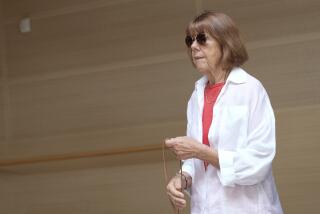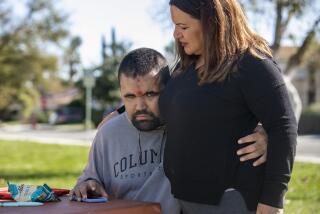Woman Uses Battered Wife Defense at Trial in Slaying of Husband
- Share via
In what may be a major test case of the “battered-wife syndrome,” a 70-year-old San Gabriel woman told Wednesday of being subjected to 48 years of abuse by her husband before she killed him in self-defense.
During an hour of testimony in her Pasadena Superior Court trial on a charge of first-degree murder, Frances Caccavale, a petite, bespectacled grandmother of three, spoke of numerous episodes of physical and psychological abuse that began three months after the couple married in 1936.
“He told me he was the man of the house. He punched me and threw me on the bed and started flipping cigarette ashes across my chest,” she testified, describing the first episode. “He didn’t stop until the cigarette was finished.”
Caccavale broke down several times and at one point her testimony became so emotional that jurors appeared on the verge of tears and averted their eyes.
Caccavale’s attorneys, David L. Chapman and Barbara E. Roberts, have said the trial represents one of the few cases nationwide in which the legitimacy of the battered wife syndrome will be fully tested. Too often, they said, the syndrome has come up in murder trials as a peripheral issue or as a last-ditch ploy by defense lawyers.
Also, the Caccavale trial is believed to be only the second time that a Los Angeles County judge has allowed expert testimony on the battered wife syndrome.
Nancy Kaser-Boyd, a clinical psychologist, will testify Friday in general terms about the syndrome, displayed by women who submit to abuse from their husbands for many years before taking revenge--often violently. It will be up to Caccavale’s defense attorneys to prove that she actually suffered from it.
Caccavale fatally stabbed her husband, Frank, three times in the back last Aug. 31 after a reported final attempt at reconciliation--a vacation with her husband last August to visit relatives in Brooklyn. The couple argued and the husband returned home to Los Angeles without his wife. When she arrived two weeks later, a final confrontation ensued.
In a taped confession played to the court Tuesday, Caccavale said her husband was packing his bags to leave when he threatened to kill her and appeared to reach for a gun hidden under a bed. Jurors heard her relating that she told her husband, “You’re not leaving me stranded after 50 years.”
She said he responded, “If you don’t leave me alone I’ll kill you.” Then, she said, he reached under the bed for the gun.
“I just stabbed him and stabbed him and stabbed him,” she said on the tape. “He just toppled over and started making moans and I looked and said, ‘You’re not dead. No you’re not, because you tortured me for 50 years. Fifty years you tortured me and now I’m going to torture you.’ ”
The battered wife syndrome defense is an unusual and still-evolving legal concept seeking to expand the traditional definition of self-defense. Self-defense has been based on the theory that a person can use that degree of force reasonably necessary to defend him or herself against what is believed at the moment to be an imminent attack.
The battered wife syndrome defense, however, holds that past abuse is relevant in understanding a woman’s state of mind at the moment of attack and that years of physical and emotional abuse can justify the killing of a spouse under certain circumstances.
Not even Deputy Dist. Atty. Judson W. Morris Jr. has challenged its introduction as a central issue in the Caccavale trial. Morris, who closed the prosecution’s case Tuesday after calling four witnesses and playing the taped confession, argues that Caccavale killed her husband out of desperation and anger because he was leaving her.
“They had their final fight and he was leaving,” Morris said in opening comments. “She wasn’t about to be left, as you’ll hear in her own words, on $223 a month Social Security.”
Morris concluded that Frank Caccavale’s threat to leave “was an awful thing to do . . . but that does not justify the taking of a life and is not self-defense in any way, shape or form.”
During her testimony Wednesday, Caccavale maintained--as she did in an interview with The Times soon after the slaying--that she endured years of physical and emotional abuse by her husband.
But she said she held out hopes that things would one day get better as she followed her husband from town to town and job to job.
She said her husband had grown despondent since the couple’s only child, a son, died of cancer in 1976. In the last few years, she said, her husband became increasingly alienated and depressed, sometimes sleeping up to 72 hours straight. He would awake only for a cup of instant coffee and to go to the bathroom.
‘Couldn’t Take It No More’
“It’s been one torment after another,” she testified. “He would be glad two days and then mad five days. I just couldn’t take it no more.” During two days of testimony, Caccavale’s relatives supported her contention of long abuse, recalling that she once checked into a New York hospital with broken and bruised ribs. Rose Veri, Caccavale’s 70-year-old aunt, said small gatherings at Veri’s Rosemead home often ended with Frank Caccavale beating his wife as they were leaving.
Chapman said outside of court that a cycle of tension building, violence and then reconciliation leads to a “learned helplessness” on the part of the battered woman. He said a confluence of factors made Caccavale a textbook victim of the syndrome.
He said the couple were bound by strong cultural forces, including a shared ethnic heritage and strict religious upbringing. In addition, the wife did not work and depended upon her husband for survival.
“I did marry him for better or for worse,” she testified. “It was my luck to get the worst of it.”
More to Read
Sign up for Essential California
The most important California stories and recommendations in your inbox every morning.
You may occasionally receive promotional content from the Los Angeles Times.













